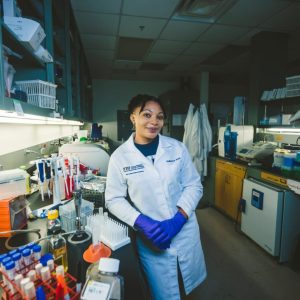 Most antibiotics on the market are becoming less effective. Arsenic may hold the answer todefeating resistant bacteria that have learned to fight back against the drugs designed to kill them.
Most antibiotics on the market are becoming less effective. Arsenic may hold the answer todefeating resistant bacteria that have learned to fight back against the drugs designed to kill them.

Patience Ngozi Paul wants to understand how this therapeutic poison could be used to create the next generation of novel, more effective antibiotics against deadly Mycobacteria, which cause tuberculosis.
Can a deadly poison help fight a silent pandemic? Join Patience Paul as she delves into her groundbreaking research on how arsenic could solve one of humanity’s greatest challenges — antibiotic resistance.
Paul, a biomedical sciences Ph.D. candidate in the FIU Herbert Wertheim College of Medicine, is investigating arsinothricin (AST) — a new, broad-spectrum antibiotic containing arsenic discovered by Paul, and her advisors Distinguished University Professor Barry P. Rosen and assistant professor Masafumi Yoshinaga, along with a team of international researchers. Specifically, she’s looking at how AST gets into bacterial cells. These cells have a membrane barrier preventing antibiotics from entering them. The goal is to ensure AST successfully gets into and destroys the bacteria cell.
Paul’s research lays important groundwork and sets the stage for the development of drugs that can successfully overcome antibiotic resistance.





